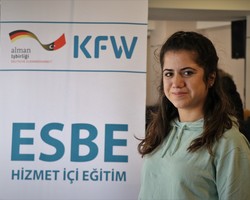The story of Rojan: making a difference in the lives of Syrian patients

WHO/Celik Ozuduru
“Every single day I make a difference in the lives of Syrian patients and I am proud of that,” says Rojan Mistikale, member of the WHO Turkey Community Health Support Staff (CHSS) in Izmir.
Twenty-one-year-old Rojan Mistikale is a committed CHSS member. She joined the CHSS programme a year ago. Rojan is the sole income earner in a family of four. When the conflict in Syria began, Rojan came to Turkey with her two younger siblings and her mother. She started to learn Turkish and continues to study it on weekends to further improve her language skills.
Rojan is happy to be part of the Community Health Support Staff. Not only is it her source of income, but it also helps her relieve stress and anxiety. “Personally, I found this job very rewarding. Every single day I make a difference in the lives of Syrian patients and I am proud of that,” says Rojan.
“My workday starts with phone calls to families of homebound patients. We inform them in advance that we will be visiting them. As a team of CHSS, we consider our first and foremost priority to be self-care and patient privacy. We have a list of 114 home care patients to whom we provide our outreach services such as active and passive exercises in and out of bed; pressure sore prevention and treatment; changing bedding, linen and clothes; monitoring medicine expiration dates and following up on regular medicine use; identifying nutrition problems and referring them to a doctor; assistance with toilet needs and diaper changes; feeding the patient; hand, foot and nail care; monitoring blood pressure; oral and dental prosthetic care; organizing and sterilizing the living space; and basic wound care.”
Rojan notes that although her current situation has improved, she misses her life back in Syria before the war. “I am thankful that we a have roof over our heads. Now that I have an income, I picked up my studies where I left off 10 years ago. I had to drop out when the civil war started back in Syria. Because we were in survival mode, I was not able to get the education I needed until now. I hope that one day I will become a nurse,” she adds.
Rojan recently attended a week-long training in Izmir on improving outreach to older and disabled patients. The training held on 2 and 6 December 2019 was organized jointly by WHO and the Turkish Ministry of Health. It covered topics such as:
- communication skills and home visit steps
- communicable diseases
- healthy diet for home care patients
- hygiene and self-care
- patient mobilization and safety
- caring for patients with surgical wounds
- first aid.
About the Community Health Support Staff project
The Community Health Support Staff (CHSS) project supports the employment of Syrian personnel in the Turkish health sector. It acts as a bridge between patients and the Migrant Health Centres by having CHSS on the constant lookout for more complicated health issues that may require intervention by a doctor from the Refugee Health Training Centre.
As part of the programme CHSS can attend trainings on providing home care to the elderly and disabled, which are regularly offered by WHO. This gives employment opportunities to the participants and provides access to primary health care services to the patients.
The programme was launched in WHO’s seven Refugee Health Training Centres in 2018. As of January 2020, 279 CHSS members have been hired and 815 patients have benefited from home care services.
The project is run jointly by the World Health Organization and the Turkish Ministry of Health and funded by the German Government through KfW Development Bank.



